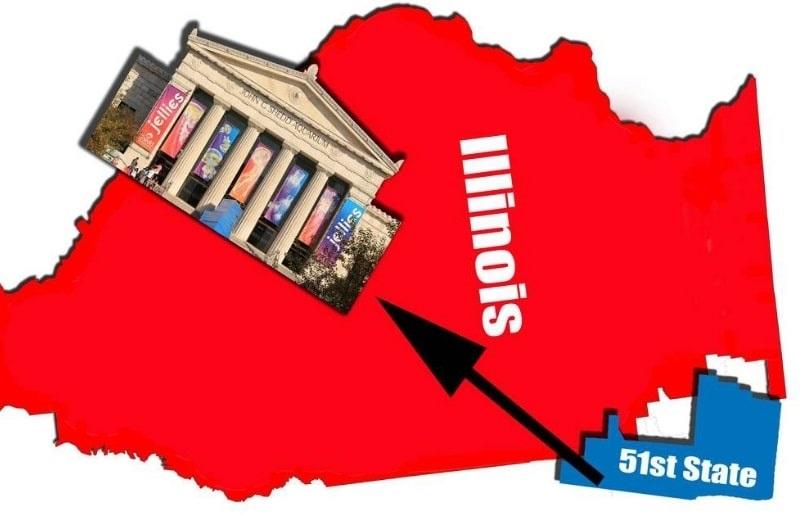Authored by Kelli Ballard via Liberty Nation,
Illinois Republicans push to be rid of Chicago by making it the 51st state – but will that help the conservative cause, or hurt it?
Illinois just tried to jump on the newest trend of separating cities from states with a new proposal, HR101. If approved, this would detach the city of Chicago and make it the 51st state. While this is nothing new for Illinois, which has been fighting for years to distance itself from the more liberal and powerful city, the idea is growing in popularity.
Chicago Vs Illinois
Republicans who pushed for the House Resolution argue that the city ends up controlling the rest of the state. “Our traditional family values seem to be under attack at every angle,” said Rep. Brad Halbrook.
“The issue of life, the issue of marriage, the school curriculum. Everything these people hold near and dear to their hearts — our hearts — is under attack by far-left legislators from the city.”
The potential loss of traditional values isn’t the only reason many seek to separate city from state. Chicago has a population of approximately 2.7 million and a very different political stance.
“The reality is the city of Chicago is competing with New York City and L.A. and San Francisco, and (downstate is) competing against rural Indiana and rural Missouri,” Rep. C.D. Davidsmeyer said. “The policies that come down from Chicago are actually pushing our economic opportunity away.”
The Windy City also differs on important issues such as gun control and illegal immigration. Chicago wants stricter firearm regulation while the rural state supports sanctuary for gun owners. And, when it comes to open borders, the more conservative state pushes for immigration control while the blue city follows the Democrats’ lead.
Proponents for the split claim their tax dollars go mostly toward the city, while opponents say the rest of the state receive more in federal and state grants for low income families because the majority of low to moderate income households are outside Chicago.
Pros And Cons
Probably one of the biggest advantages in favor of the separation is more representation for the state’s conservative populous when it comes to local and state elections and laws since Chicago’s massive population heavily sways the outcome. According to HR101:
“WHEREAS, The divide between the City of Chicago and downstate Illinois is frequently manifested in electoral results such as the 2010 gubernatorial election in which the Democrat candidate won the election despite only carrying four counties out of 102 counties, and, if fact, did not need to carry any other counties to win because of the margin of victory in Chicago and Cook County; and
“WHEREAS, The City of Chicago is frequently treated as a separate region of the State and has often been exempted from major legislative initiatives the General Assembly enacts in law because of this fact.”
Separating the city from the state is worrisome, however, for those on both sides of the political aisle. While it may help rural Illinois to have more control in local lawmaking, some conservatives fear the move will just create another Democratic seat which would end up usurping even more of the Republican power. Consider that each state gets two senators in Congress. If the issue is that Chicago is a liberal hotbed while the rest of the state leans conservative, then creating two more seats in the U.S. Senate that seem destined to be ever filled by progressive Democrats hardly seems a viable long-term solution.
Economically speaking, Chicago has much more industry and business opportunities that the state could lose out on if the split becomes a reality. Professor John Jackson explained that they “don’t have anything close to that in the more rural parts (of downstate).”
“People say Chicago’s a huge economy, there’s no way you can survive without them, (but) I have people on the other side saying Chicago’s killing us with their policies, we need to separate,” Davidsmeyer said. “I’m one of the people in the middle saying let’s see both sides of it.”
Illinois isn’t the only state to consider kicking out one of its powerful and influential cities. New York residents have been fighting to make New York City the next new state. Washington state recently suggested splitting the east from the west so that the extremely liberal city of Seattle would not have so much say in the governing of more conservative areas in the eastern region. California has been trying for years to split the Golden State into three separate entities, while another group seeks complete secession. Could the fracturing of these states be the solution that best serves the most people, or would it, at best, be only temporary fix – until the newly minted progressive senators start to turn the tide of Congress?
via ZeroHedge News http://bit.ly/2W1vIyC Tyler Durden

